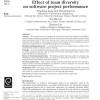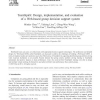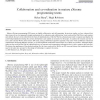168
Voted
ADHOC
2004
15 years 2 months ago
2004
In this paper, we study a new multicast paradigm for large scale mobile ad hoc networks, namely team multicast. In team multicast the multicast group does not consist of individua...
108
Voted
IMDS
2007
15 years 2 months ago
2007
Purpose – This research seeks to investigate the relationship between knowledge diversity (KD) in software teams and project performance. Previous research has shown that member...
113
Voted
TC
2008
15 years 2 months ago
2008
Abstract--Testing security systems is challenging because a system's authors have to play the double role of attackers and defenders. Red Team/Blue Team exercises are an inval...
109
Voted
DSS
2007
15 years 2 months ago
2007
Distributed teams can carry out critical tasks with appropriate decision support technologies. The architecture and detailed design of a Web-based GDSS, called TeamSpirit, are dis...
136
click to vote
IJRR
2006
15 years 2 months ago
2006
Current technological developments and application-driven demands are bringing us closer to the realization of autonomous multirobot systems performing increasingly complex missio...
115
Voted
IJMMS
2008
15 years 2 months ago
2008
Mature eXtreme programming (XP) teams are highly collaborative and self-organising. In previous studies, we have observed that these teams rely on two apparently simple mechanisms...
118
Voted
DSS
2006
15 years 2 months ago
2006
Proactive information sharing is a challenging issue faced by intelligence agencies in effectively making critical decisions under time pressure in areas related to homeland secur...
116
Voted
AIEDAM
2007
15 years 2 months ago
2007
This paper presents an ontological framework for situated design teams in which the team is both the subject and the object of designing. Team designing is modelled using the set o...
118
Voted
ATAL
2010
Springer
15 years 3 months ago
2010
Springer
A major challenge for traditional approaches to multiagent learning is to train teams that easily scale to include additional agents. The problem is that such approaches typically...
127
Voted
ATAL
2010
Springer
15 years 3 months ago
2010
Springer
Large heterogeneous teams will often be in situations where sensor data that is uncertain and conflicting is shared across a peer-to-peer network. Not every team member will have ...



